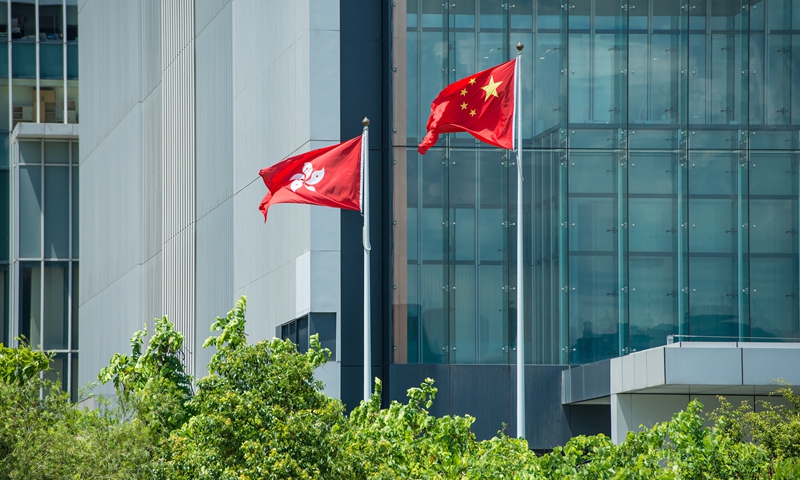HONG KONG / FEATURE 3
National security law in HK may be completed within half year: experts
Move demonstrates central government’s determination to crackdown secessionism, subversion

HK File Photo: VCG
After a preparatory meeting for the third session of the 13th National People's Congress (NPC), Zhang Yesui, spokesperson of the NPC, announced a new agenda and arrangements for the national security law to be implemented in the Hong Kong Special Administrative Region (HKSAR).
The proposed legislation indicates the central government's firm determination to fix the loopholes within the legislative system of the HKSAR while intervention and stigmatization from external forces and local separatists continue to erode the foundation of the South China city, deputies and members to the two sessions told the Global Times. And this also shows that the central government would safeguard China's core interests at all costs.
The move came after a growing number of Hong Kong deputies and members to the 2020 two sessions - the country's most important annual political event - called for the passing of national security legislation in the Special Administrative Region (SAR) as the city has become the latest battleground for secessionist forces, following the months-long turmoil in 2019. Passing the law has become an urgent task for both the central government and the HKSAR government.
The 3rd session of 13th NPC will deliberate the bill put forward by the NPC Standing Committee on reviewing a draft decision of the NPC on establishing and improving the legal system and enforcement mechanisms for the HKSAR to safeguard national security. It would take effect by being included in Annex III of the Basic Law, as some Hong Kong media outlets have anticipated, which needs no approval by Hong Kong's Legislative Council.
The fourth plenary session of the 19th CPC Central Committee proposed the improvement of the legal system and implementation mechanism for the special administrative regions to safeguard national security, Zhang Yesui, spokesperson of the NPC, told a press conference on Thursday night, noting that the HKSAR is an inseparable part of the People's Republic of China, and the NPC is the highest authority in the country.
"It is absolutely necessary for the NPC to exercise the functions and powers entrusted to it by the Constitution, to establish and improve the legal system and enforcement mechanism of the HKSAR to safeguard national security at the national level, and to uphold and improve the governance system of "One Country, Two Systems," Zhang said.
The Democratic Alliance for the Betterment and Progress of Hong Kong - the largest pro-establishment group in Hong Kong - welcomes and fully supports the proposal. 23 years after Hong Kong returned to the motherland, it has yet to meet its constitutional responsibilities as loopholes existing in the city's legislation due to the lack of Article 23, the group said in a statement sent to the Global Times.
The Article 23 of the Basic Law, says the city "shall enact laws on its own to prohibit any act of treason, secession, sedition, subversion against the central government, or theft of state secrets", and prohibits various forms of foreign political interference.
In the face of mounting external pressures, the Hong Kong Special Administrative Region government's ability to govern has been continuously weakened, and confidence has been lost in the SAR government to push forward Article 23 of the Basic Law in the short term, Lau Siu-kai, vice president of the Chinese Association of Hong Kong and Macao Studies, told the Global Times on Thursday.
Lau, as one of the senior advisors to the central government on Hong Kong affairs, said the move shows that the central government will protect the territory from falling into the hands of the hostile forces at all cost.
The decision to propose a national security law for Hong Kong has been adopted by the supreme organ of power with legal effect after discussions at the NPC, which will allow the NPC Standing Committee to conduct legislative work. The NPC Standing Committee meeting is usually held every two months, with each session lasting about a week, Li Xiaobing, an expert on Hong Kong, Macao and Taiwan at Nankai University in Tianjin, told the Global Times on Thursday.
"If there are special requirements, the committee might convene temporary meetings, accelerating the legal process of the national law for Hong Kong, which is expected to be passed within half a year, or even sooner," he said.
To propose such law for Hong Kong aims to not only tackle the chaos in Hong Kong, but also respond to the some security threats emerged in the SAR to the country, Lau said, noting that while the riots continue in Hong Kong and the US increases its efforts to contain the Chinese mainland, Washington's intention of using Hong Kong as a pawn to counterbalance the China has become increasingly palpable.
The delayed passage of Article 23 of the Hong Kong Basic Law is widely believed to become a major factor that has led to relentless radical protests in the city since last year, which has engulfed the once-prosperous Asian financial hub and business crossroads into long-term recession.
Support of HK people
A coalition of the alliance for Article 23, Politihk Social Strategic and Citizens Alliance of HK, on Thursday presented a letter to Carrie Lam, chief executive of the HKSAR government, urging the complete enactment of Article 23 of the Basic Law within the term of the incumbent LegCo, according to a copy of the letter the coalition sent to the Global Times.
"More than 2 million citizens have signed a petition in support of the Article 23 throughout the 18 districts in the city, showing that there is a fundamental call for the passage of the legislation," the letter read.
Witman Hung Wai-man, principal liaison officer for Hong Kong at the Shenzhen Qianhai Authority and a Hong Kong deputy to the NPC, told the Global Times on Thursday that Article 23 legislation has almost been stigmatized since 2003 when a mass protest was staged to oppose the passing of it. He noted the legislation will meet opposition whenever it is promoted.
"There is never a right time. Article 23 is the constitutional duty of the HKSAR and we need to fulfill that duty instead of waiting for the right time. We need to create the right time and right environment, including education, publicity, lobbying and crafting a good law," Hung said.
More than 10 deputies and members to the NPC and the National Committee of the Chinese People's Political Consultative Conference (CPPCC) from the HKSAR interviewed by the Global Times on Thursday expressed their willingness to push for the legislation.
"It's everyone's responsibility to safeguard national security. So, everyone should stand up and push for it. We can't leave a vacuum which has been exploited by various forces to create chaos in Hong Kong. This is absolutely intolerable," Ma Fung-kwok, head of Hong Kong's delegation to the two sessions, told the Global Times on Thursday.
If there's no guarantee of national security, there's no business and social development, Ma said, noting that no matter what would be the major obstacles in establishing the law, policymakers have to adhere to the fundamental bottom lines, and the process can't be affected by external factors like intervention from some foreign countries.
'Absolutely legitimate'
The central government has full control over HKSAR, which is part of China, and the central government has the right to promote and improve the national security legal system of the region at the national level, Gu Min-kang, director of the Chinese Association Hong Kong and Macao Studies and former associate dean of the School of Law of City University of Hong Kong, told the Global Times.
Article 18 of the Basic Law states that only national laws listed in Annex III of the Basic Law can be implemented in Hong Kong. Therefore, in order to comply with the "one country, two systems," the legislature of establishing and improving the legal system and enforcement mechanisms for Hong Kong and the National Security Law will not be completely consistent, and the coverage will also be adjusted, the expert said.
To establish and improve the legal system to safeguard national security, it is also necessary to solve the supporting mechanisms of Hong Kong's judicial system, such as the establishment of courts specializing in national security crimes, or learn from Macao to allow only Chinese judges and prosecutors to handle cases involving national security, or set up a special committee to safeguard national security.
Given the legislation would be a national law, it can be written into the regulations that establish a central-level national security mechanism, Li noted. In the future, if Hong Kong enacts Article 23 of the Basic Law on its own, it will hopefully form a "double-level" system to safeguard national security in Hong Kong.
Some local reports in Hong Kong have been speculating that anti-government forces are now plotting new protests and riots throughout the city, inciting violence as a response to the draft decision, which will inevitably incur fierce reactions and protests in the city.
However, the central government's determination would also change the psychological expectations of pan-democratic groups, which might reverse the situation in Hong Kong, Lau said, noting that some people always had this delusion that the central government would not take aggressive and decisive measures as it is afraid of a public backlash in Hong Kong or US sanctions.
"But they have to reevaluate the price they are willing to pay to achieve their goals," he said.
After the new national security law is passed in Hong Kong, the HKSAR government needs to translate the requirements of the law into specific policies of the government, Tang King Shing, former commissioner of the Hong Kong Police Force (HKPF), told the Global Times on Thursday.
"For example, to determine whether the law is to be enforced by the Hong Kong Police Force and by which department of the force, while also to give out specific opinions to require the Department of Justice to give law enforcement authorities the power to arrest and search, and court evidence," he said.
However, in the face of a possible resurgence in violent activities, Tang noted that in the short term, some residents who may sympathize with the rioters may be dissatisfied with this new law, so street violence may follow.
However, we believe the HKPF will be able to handle it. In the long run, this legislation will help the HKPF and other law enforcement agencies to effectively safeguard Hong Kong's peace and national security, he noted.
"The city won't become the Achilles' heel of the country," Tang said.

